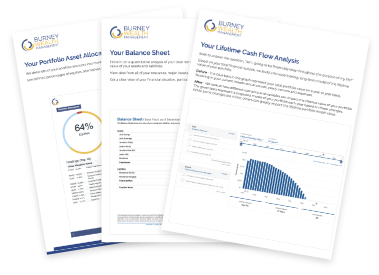The Importance of Your Financial Health

It is easy to put off making a big decision like hiring a financial advisor. Perhaps you find it unnecessary or something to worry about later when the need to plan feels “more urgent”. Or maybe you think you can handle it on your own by conducting research on Google and asking friends for advice. What many people don’t realize is there are numerous hidden complexities to each big financial decision. By ignoring these complexities, you might be faced with some serious negative side effects on your overall financial health.
With the term “financial health” comes a question: Why isn’t the same emphasis placed on financial health as is placed on physical health? There are many striking comparisons between the two as both impact your goals and capabilities and can be improved with precautionary actions. These comparisons may shed light on why it’s important to take care of your financial health with the same attention you would with your personal health.
Self-Diagnosing/Self-Managing
When you get an injury or feel ill, you may start the diagnostic process by visiting a website like WebMD. We’ve all been there, spiraling down a rabbit hole of different potential diagnoses and treatments. In the end, it’s easy to feel discouraged and emotional. I’ve personally found myself searching for a cough and ending on a page diagnosing myself with a rare disease. Your next move would likely be to turn to a doctor for guidance and reassurance. Why? Because they are professionals with experience and knowledge.
We see this “I can do it myself” attitude a lot in personal finance. With the internet and numerous resources available, you may feel like you have every tool you need. When it works it feels great; however, when it doesn’t work, it can be detrimental to your long-term financial well-being. Putting a band-aid on your financial situation is a short-term solution but, remember, you’re investing for the long-term. It’s important to have a plan in place that considers your future goals and helps you get there with confidence. Many decisions impact one another, even when we don’t realize it. For example, the decision to take money from a certain type of account could adversely impact our tax situation for the year. A financial advisor will consider these factors in the context of your financial plan before making decisions.
Self-managing can also create an enormous amount of stress and anxiety. Many investors are constantly checking the markets and acting based on emotion rather than logic. Working with a professional can provide peace of mind and alleviate the physical pain that often comes with watching market fluctuations. A qualified advisor can leverage their experience and education to guide you to a strong financial future, one that you’re able to enjoy without the constant stress of watching the market.
Check-Ins
Even if you’re not feeling sick, it’s a good idea to get a check-up on a regular basis. This is to make sure everything is looking good and working smoothly. The same idea applies to your financial plan. Some people think they can create their financial plan and they are set for life. Apply that same logic to a doctor’s visit. While it would be nice to carry the same blood panel results you got at age 30 through your entire lifetime, it’s unrealistic. Your life is constantly changing, and that impacts both your physical and financial health.
It’s important to revisit your plan regularly to make sure it is still aligned with your goals. While a doctor may check your blood pressure, weight, or temperature, your advisor will review your current tax situation, insurance needs, asset allocation, risk tolerance, and more. They will be able to take these considerations into account to provide a plan optimized for you. As mentioned earlier, different decisions trigger different outcomes. Professionals are trained to assess your plan holistically while considering the domino effect that many decisions can have.
Just like with a doctor’s visit, it’s important to be proactive with financial health. With the effects of compounding interest, changes early on can save you significant amounts of money – money that can be used to fund your life goals. At Burney Wealth Management, you are supported by both CFP Professionals and CFA Charterholders in-house. We have tools to show you the impact that different choices will have on your overall financial health. Reach out to an advisor on our team to schedule your check-in.
The Burney Company is an SEC-registered investment adviser. Burney Wealth Management is a division of the Burney Company. Registration with the SEC or any state securities authority does not imply that Burney Company or any of its principals or employees possesses a particular level of skill or training in the investment advisory business or any other business. Burney Company does not provide legal, tax, or accounting advice, but offers it through third parties. Before making any financial decisions, clients should consult their legal and/or tax advisors.




